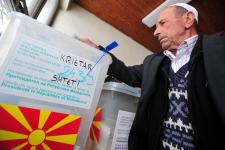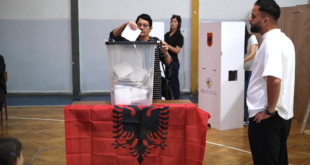 The low turnout of ethnic Albanians in Sunday’s presidential election was because they felt neglected by the two presidential frontrunners, who are ethnic Macedonians, according to local analysts.
The low turnout of ethnic Albanians in Sunday’s presidential election was because they felt neglected by the two presidential frontrunners, who are ethnic Macedonians, according to local analysts.
The poll barely succeeded with a turnout of 42 per cent, only slightly above the required 40 per cent threshold. This was largely due to the low turnout evident in ethnic Albanian-populated areas. Ethnic Albanians make up one-quarter of Macedonia’s population.
“Both candidates neglected the Albanian electorate. Nobody addressed them or made any clear promises to gain their support, except for a few empty NATO and EU statements here and there” political analyst Suad Misini told local A1 TV.
Data showed that in some municipalities the ethnic Albanian turnout for the parallel local election was considerably higher than for the presidential poll that barely achieved a small percentage.
Before the first round of elections, the ruling VMRO-DPMNE party and its coalition partner from the Albanian bloc, the Democratic Union for Integration, DUI, agreed a deal for support of VMRO’s now-winning candidate, Georgi Ivanov.
But “the Albanians showed they are not just a voting machine for the parties”, the political analyst and publicist Kim Mehmeti told the same TV station. He explained that this community finally woke up, and for the first time in the two-decades-old pluralistic Macedonia, resisted party manipulation.
“The politicians must understand that a simple deal between them is not enough. You have to offer something to the voters”, Mehmeti argued.
The State Election Commission’s latest figures confirm that conservative Georgi Ivanov of the ruling centre-right VMRO-DPMNE party, won Sunday’s presidential race.
Preliminary reports of domestic and international monitors say the voting went mainly smoothly, with some isolated cases of group voting. The Organisation for Security and Cooperation in Europe will publish its report later in the day.
If Macedonia receives a positive assessment of the second round of voting, it can hope for a swift removal of the EU visa regime for travelling Macedonian citizens, as well as a date for the start of its EU accession talks this autumn.
Macedonia has been an EU candidate state since 2005, though the EC last year said that Skopje was still not ready for the start of accession talks, largely because of the violence and allegations of fraud that marred the 2008 general election.
 Eurasia Press & News
Eurasia Press & News


